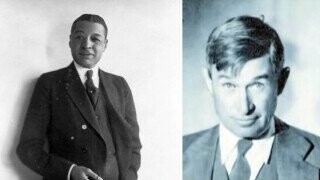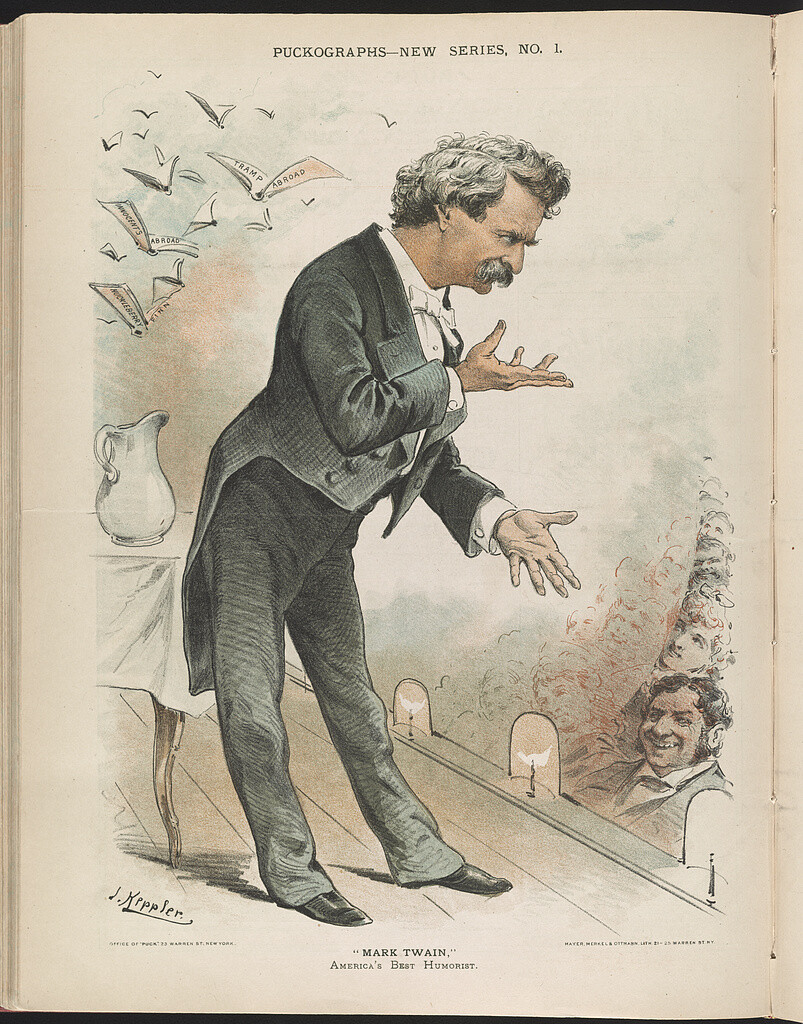Who Was the First Stand-Up Comic?

We’ve partnered with the legendary Stand Up! Records to offer three winners each a bundle of four comedy specials on vinyl. Vinyl! Enter below for your chance to win and learn more here.
From the first time a cave-guy threw a rock at the head of another Neanderthal and got a laugh, we’ve had comedy. But as for the first stand-up comedian? The cave walls have yet to reveal that story.
Don't Miss
Heck, we’re not even certain where the term “stand-up comic” comes from. Comedian Dick Curtis, in Kliph Nesteroff’s The Comedians: Drunks, Thieves, Scoundrels and the History of American Comedy, says the Mob may have coined the term in the 1930s. “The Outfit managed fighters and they managed clubs that booked comics. A guy who just stood there and punched jokes—joke, joke, joke—he was a stand-up comic.”
But we can go back further than that. According to comedy academic Oliver Double, a 1917 edition of the Yorkshire Evening Post wrote about Finlay Dunn, a performer who was “what he calls 'a stand-up comedian.'" In fact, Dunn may have been “doing stand-up” as far back as the late 1800s. Does that make Dunn the first stand-up comic?
It certainly puts him in the conversation, though his act more likely consisted of funny song parodies at the piano rather than one-liners at a microphone. But if not Dunn, who was applauded for his “general buffoonery,” then who else is in the running? Here are six more contenders for the title of “First Modern Stand-Up Comic.”
Artemus Ward
First up is Artemus Ward. (His real name -- good grief! -- was Charles Browne).
He’s one of four candidates that stand-up comic and comedy historian Wayne Federman considers to be “the forefathers of American comedy.”
“There’s a comedian named Ritch Shydner who told me about Artemus Ward,” Federman recently told ComedyNerd. “And I was like, “Who’s this guy?”

Library of Congress
This guy was originally a newspaperman writing for the Cleveland Plain-Dealer in the mid-1800s, according to Federman’s book The History of Stand-Up: From Mark Twain to Dave Chappelle. As a gag, good ole’ Charlie Browne began publishing funny letters with purposely misspelled words, signed courtesy of Browne’s comic alter-ego, Artemus Ward.
The letters -- reminiscent of Jerry Seinfeld and Barry Marder’s Letters From A Nut -- did the 19th century equivalent of going viral, picked up by newspapers all over the country.
Then a funny thing happened--or if you’re Artemus Ward, maybe a not-so-funny thing. Ward, covering the entertainment beat for his paper, attended a minstrel show and was surprised to hear the performers reciting a bit straight out of one of his phony/funny letters. The Same thing happened when he went to the circus where a clown got laughs reading Ward’s material aloud.
Other comics stealing material. Not much has changed in two centuries.
If other people can get laughs with my jokes, thought Ward, why not me? The shy reporter bought a book on public speaking, created the Artemus Ward persona, quit his newspaper gig and booked himself onto the lecture circuit.
Ordinarily, these lectures were serious talks given in small theaters designed to educate and enlighten. Ward took the concept and twisted it.
His first comedy lecture, given in 1861, was called “Babes in the Wood,” a topic Ward never addressed in his hour-plus presentation. Instead, he acted as a clueless lecturer meandering through a variety of comic tangents -- a routine some historians say represents the birth of stand-up comedy.
Ward’s deadpan style -- is it possible he invented the deadpan? -- made him a favorite of the next comedy forefather on our list.
Mark Twain
Twain loved him some Artemus Ward. In fact, in Twain’s book How to Tell A Story, he holds up Ward as an example of how to be funny:
“The humorous story is told gravely; the teller does his best to conceal the fact that he even dimly suspects that there is anything funny about it… Artemus Ward used that trick a good deal.”
Twain himself took a page or two from the Ward school of comedy, says Federman, booking his own successful series of funny lectures around the world. Somehow without the benefit of cars or planes, Twain would appear in different states on consecutive days, a breathtaking tour schedule that would tax modern-day comics.

Library of Congress
While most of us remember Twain for his novels, he was in high demand as a comic performer. Today, the Kennedy Center’s Mark Twain Prize is given out every year to someone who has made a significant comedic impact on American culture.
Bert Williams
“Bert Williams was the funniest man I ever saw,” W.C. Fields said, “and the saddest man I ever knew.”

Library of Congress
Williams was also, according to Federman, America’s first Black superstar comedian. Unlike Twain and Ward, however, the lecture circuit was not an available venue for his talents. Instead, Williams began his career as a medicine show barker, the man responsible for standing outside the tent and hollering comic patter at people inside.
From there, it was on to minstrel shows (ironically, the Black comic often worked in blackface), where his popular act with partner George Walker led them all the way to Broadway. Williams & Walker started a dance craze, performed for the King of England, and became the first Black performers to record their voices for a major record company.
When illness led to Walker’s early retirement, Williams became an incredibly successful solo act, performing as a featured comedian (and the first Black performer ever) in The Ziegfeld Follies. It’s hard to find a 21st century equivalent of the show but rest assured, it was a very big deal.
Bert Williams could do it all. He wrote, starred, and directed short silent comedies, as well as sang and danced his way through a stage act. He always closed with “Nobody,” the first pre-1920 recording enshrined in the Grammy Hall of Fame.
American icon Rogers got his start as a lasso expert in a Wild West show, a performance that ironically did not require him to speak. But what he did learn, says Federman, is how to hold an audience.
He developed an act where he explained rope tricks in an aw-shucks southwestern drawl, discovering that his self-deprecating humor was a bigger hit than the cowboy act. Soon, he dropped the rope and began telling stories that made him one of the most popular men in America.

Will Rogers Memorial Museum
Rogers can’t claim to be the first guy to stand up and tell jokes to make us laugh, but he certainly took this burgeoning profession to new heights.
Dude played Broadway, poked good-natured fun at President Woodrow Wilson (to his face), did the lecture circuit, broadcast a weekly radio show, and appeared in more than 50 feature films. When he tragically died in a plane crash in 1935, all federal buildings lowered their flags to half-mast.
Charley Case

Public domain
As for other candidates? Slate offers up Charley Case, a Black vaudeville performer from the late 1800s. What made Case unusual? Some say he was the first to perform his comic monologues without the help of music, props, or costumes. Like most stand-ups now, Case was just a guy trying to make us laugh.
It’s hard to find much information about Case today, but some of his jokes survived. Case was famous for telling funny stories about his father, like this story shared by Ebony:
Charley, his brother Hank, and their father are sleeping in a bedroom when they hear a noise downstairs. “I think there’s a burglar loose in the house,” the father whispers to Hank. “You should go down and find him.” “I haven’t lost any burglars,” replied Hank. “Make Charley go down.”
What we do know about Case tells us he would fit right in with many of today’s comics -- he was quiet, even a little neurotic, often twiddling a piece of cloth or string while telling jokes on stage. As Slate says, Case may have given birth to the idea of the depressed, tortured comedian.
Frank Fay
Finally, we come to Frank Fay. Even though most people today haven’t heard of him, many consider him to be a pioneer of the stand-up style that most audiences know today.

Public domain
He was also, reportedly, a bit of a jerk. That’s us being nice. Other words used to describe Fay: Alcoholic. Abusive. Fascist. Wife-beater. Anti-semite. Actor Robert Wagner called Fay “one of the most dreadful men in the history of show business.”
But hey, he was funny!
In addition to being known for his comedy skills, he often served as master of ceremonies for different events at New York’s Palace Theater. Today’s comedy clubs opening acts often act as emcees for the evening -- Fay was likely the guy who invented that “comic host” role.
Who’s on First?
Ultimately, there’s no way of knowing who was the first stand-up. To Federman, it doesn’t really matter. What he finds interesting is how little has changed.
It’s still one fool standing in front of a group of people, trying desperately to make them laugh. It’s still the grind of the tour, going from one venue to the next, mustering the energy to put on another gratifying show. Still mining the circumstances of one’s own life and the world for funny observations. And still other comics shamelessly stealing your material.
Is there a lot to learn from those early comics? Not necessarily, says Federman. Comedy is contextual -- more than nearly any other art form, it’s a reaction to the contemporary world in which the comics live. When legendary comic Mort Sahl recently passed away, Federman heard muffled complaints that Sahl’s political humor didn’t really hold up. “Of course,” says Federman. “That’s because you don’t know Adlai Stevenson.”
But today’s funny people likely would still relate to those early comics as they’re all connected by the knowledge of what it’s like to perform live, on stage, all alone. “That terrifying-to-thrilling experience,” Federman says, is what drove them all.
For more ComedyNerd, be sure to check out:
Chris Farley And The Comedian Who Ignited America’s First Sex Scandal
'China, IL': Maybe The Most Bonkers 'Adult Swim' Show Ever
Steven Spielberg And 3 Other Legendary Directors Who Flopped At Comedy
Top image: Library of Congress
